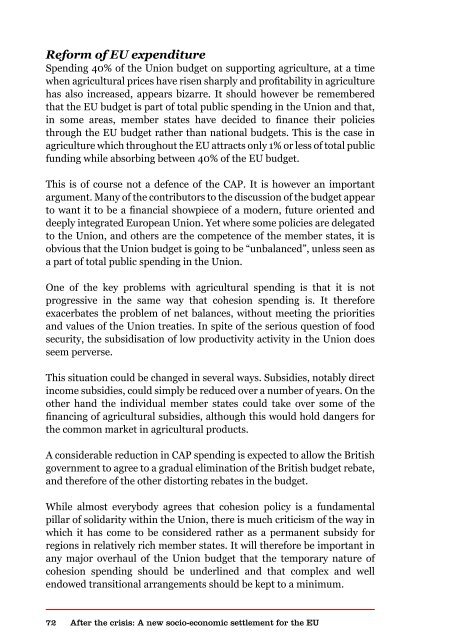Authors Iain Begg | Gabriel Glöckler | Anke Hassel ... - The Europaeum
Authors Iain Begg | Gabriel Glöckler | Anke Hassel ... - The Europaeum
Authors Iain Begg | Gabriel Glöckler | Anke Hassel ... - The Europaeum
Create successful ePaper yourself
Turn your PDF publications into a flip-book with our unique Google optimized e-Paper software.
Reform of EU expenditure<br />
Spending 40% of the Union budget on supporting agriculture, at a time<br />
when agricultural prices have risen sharply and profitability in agriculture<br />
has also increased, appears bizarre. It should however be remembered<br />
that the EU budget is part of total public spending in the Union and that,<br />
in some areas, member states have decided to finance their policies<br />
through the EU budget rather than national budgets. This is the case in<br />
agriculture which throughout the EU attracts only 1% or less of total public<br />
funding while absorbing between 40% of the EU budget.<br />
This is of course not a defence of the CAP. It is however an important<br />
argument. Many of the contributors to the discussion of the budget appear<br />
to want it to be a financial showpiece of a modern, future oriented and<br />
deeply integrated European Union. Yet where some policies are delegated<br />
to the Union, and others are the competence of the member states, it is<br />
obvious that the Union budget is going to be “unbalanced”, unless seen as<br />
a part of total public spending in the Union.<br />
One of the key problems with agricultural spending is that it is not<br />
progressive in the same way that cohesion spending is. It therefore<br />
exacerbates the problem of net balances, without meeting the priorities<br />
and values of the Union treaties. In spite of the serious question of food<br />
security, the subsidisation of low productivity activity in the Union does<br />
seem perverse.<br />
This situation could be changed in several ways. Subsidies, notably direct<br />
income subsidies, could simply be reduced over a number of years. On the<br />
other hand the individual member states could take over some of the<br />
financing of agricultural subsidies, although this would hold dangers for<br />
the common market in agricultural products.<br />
A considerable reduction in CAP spending is expected to allow the British<br />
government to agree to a gradual elimination of the British budget rebate,<br />
and therefore of the other distorting rebates in the budget.<br />
While almost everybody agrees that cohesion policy is a fundamental<br />
pillar of solidarity within the Union, there is much criticism of the way in<br />
which it has come to be considered rather as a permanent subsidy for<br />
regions in relatively rich member states. It will therefore be important in<br />
any major overhaul of the Union budget that the temporary nature of<br />
cohesion spending should be underlined and that complex and well<br />
endowed transitional arrangements should be kept to a minimum.<br />
72<br />
After the crisis: A new socio-economic settlement for the EU

















